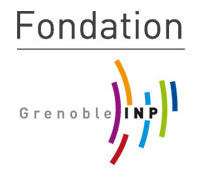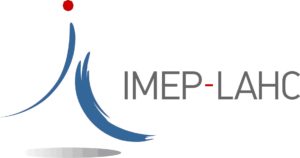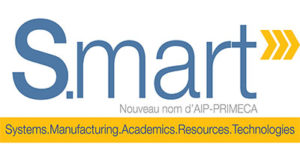3D printed electronic for Molded Interconnected Devices (MID) dedicated to Internet of Things applications
Published : 11 April 2018





Within the framework of a Chaire Industrielle d’Excellence MINT*, the PHD relies on a direct printing technology of functional inks on tridimensional objects coupled with a robotic system. Electronic circuits are built directly on top of the mechanical parts and take benefit from the 3D deposition freedom given by this additive manufacturing technology. Such a 3D electronic is so combined with the mechanical substrate that its mechatronic integration is enhanced.
The increase of connected products on the market is exponential, for IoT and Industrial-IoT applications, leading to innovative manufacturing technologies needs for mechatronic integration.
The Phd work is dedicated to 3D electronic printing of functional inks on mechanical thermoplastic products. Printing process will be settled and synchronized on the existing 6 axis robotic platform. Within a 1st step, the student must adapt the printing process of functional inks and conductive pastes for 3D deposition on thermoplastic parts. She/He will optimize the associated curing process as well.
The 2nd Phd target is devoted to electronic design and stacking architectures of components. The goal is to take advantage of the multi-materials printing potential of the technology in addition to the 3D geometry of the substrate. Conductive tracks and printed components will be characterized versus their properties, reliability, and ageing behavior. Those measurements will be conducted first on 2D thermoplastic substrates within LGP2 and IMEP-LAHC laboratories. Afterward, they will be deployed on 3D products within S-Mart.DS robotic platform. The student will then explore the possibilities offered by the 3D additive manufacturing process in terms of innovative electronic design and system architecture for IoT-Industrial applications.
Due to the multidisciplinary domains of the skills involved, the applicant will rely on the expertise of the members of the Chaire Industrielle d’Excellence MINT*:
LGP2 : laboratory of printed electronic on flexible substrates
IMEP-LAHC : laboratory of design and characterization of advanced electronic systems
S-MART DS : technological plateform dedicated to industrial engineering
Schneider Electric : industrial company leader in energy management
With general technical skills, the applicant background needs to encompass materials physics (rheology, physicochemistry), mechatronic and electronic (passive components, sensors, antenna), as well as mechanic and robotic (dimensional control, trajectory tracking).
Open and curious, she/he appeals to work within a multidisciplinary context. Proactive and autonomous, she/he is found of experimental work and is very adaptive to laboratory and industrial platform environments. Her/His human skills make her/him evolve serenely within the various team involved in the Chaire MINT. She/He must have the ability to easily write scientific reports (French language) and present her/his work to the Chaire’s members during Scientific committees.
English language is mandatory as the Phd student should attend international conferences and submit papers within major scientific journals.
Remuneration : 2200 € gross /month
Contact : Mme N. Reverdy-Bruas (Grenoble INP) : nadege.reverdy-bruas@pagora.grenoble-inp.fr
*http://fondation-grenoble-inp.fr/nos-actions/contribuer-developpement-recherche/chaire-mint/



 Contact us
Contact us How to find us
How to find us









